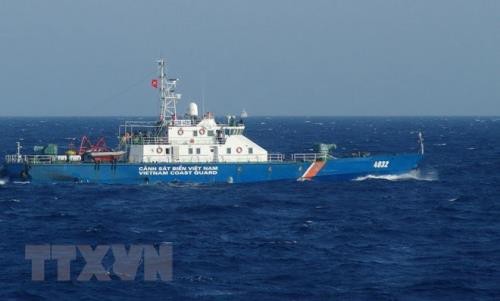(VOVWORLD) - China’s vessel Haiyang Yizhi 8 and its escorts encroaching in Vietnamese waters have revoked a backlash internationally. China’s activities have put the region and the world at risk and triggered a negative reaction.
 Vietnam Coast Guard ship Vietnam Coast Guard ship |
Since China’s “9-dotted line based on historical evidence” claim was rejected by the International Court of Arbitration in 2016, China has sought a new way to justify its baseless sovereignty claim. China’s Haiyang Yizhi 8 and its escorts have regularly violated Vietnam’s exclusive economic zone in an effort to turn Vietnam’s undisputed waters into disputed waters and disrupt the legal maritime activities of other coastal states to realize its scheme of monopolizing the East Sea.
China’s tactic of escalating tension
Lucio Blanco Pitlo, a Research Fellow at the Asia-Pacific Pathways to Progress Foundation and the South Korea Study Center at Philippine’s University, says China has stepped up intervention in the legal maritime activities of other coastal states – not just Vietnam, but also the Philippines, Malaysia, and Indonesia. China has increased pressure on foreign companies and groups to suspend exploitation projects in the “9-dotted line” area, which China brazenly and baselessly claims, as well as adjacent sea areas.
China’s claims are illegal and invalid, Pitlo says: “The 9-dotted line claim was invalidated by the 2016 ruling because it’s primarily based on a historic line which was contrary to international law, notably the UNCLOS. China’s vessel and escorts entering Vietnam’s EEZ has seriously violated the UNCLOS and Vietnamese law. It shows that China wants to escalate tension and accepts huge risks caused by its actions.”
In 2016 China’s brazen claim that the Philippines’ Scarborough Shoal belongs to China was ruled out by the PCA. The PCA’s ruling was in line with the 1982 UN Convention on the Law of the Sea.
Ambassador Pham Quang Vinh, Vietnam’s former Deputy Minister of Foreign Affairs, said: “First, China’s violation of the sea area under Vietnam’s sovereignty and in Vietnam’s exclusive economic zone is unacceptable. Second, the PCA’s ruling in 2016 is consistent with the 1982 UNCLOS. Its ruling is part of international law. Any action flouting international law is invalid.”
China’s tactics may have adverse consequences
Experts say China’s tactics have increased international concern and rallied support for the other coastal states’ effort to resist China’s ambitions. ASEAN has strengthened its determination to fight China’s attempts to prevent foreign groups from doing business with the other coastal states.
Mr. Pitlo said that China’s activities in the East Sea have affected its interests as well as regional peace and stability. China doesn’t want to be seen as an irresponsible power. If China cannot be seen as a regional leader, how can it claims to be a global leader.
Respecting and abiding by international law are important norms for both big and small nations. China has a responsibility to contribute to regional and global peace, stability, and security by abiding by international law and the UNCLOS. Vietnam and ASEAN respect their relations with China and work together for regional peace, stability and development. It’s time for China to honor its words pledge to peacefully cooperate and partner with other countries.
China is ignoring its own words. It is undermining trust and putting at risk the region and the world.